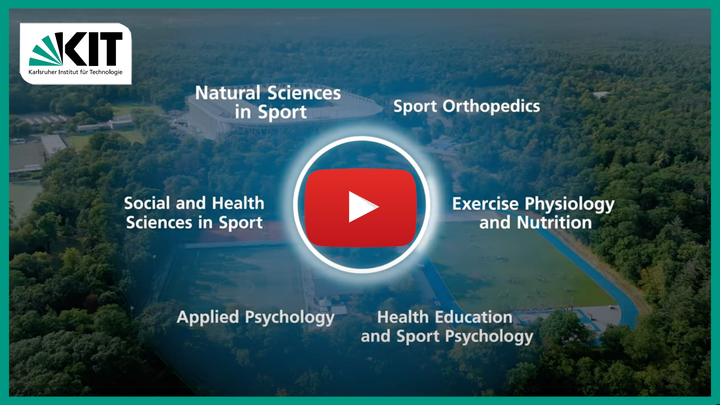Research
Research profile
The goal of research at the Institute of Sports and Sports Science (IfSS) is to identify sports science findings in both general and applied areas. In addition, it also forms the foundation of research-oriented teaching. It is characterized by an interdisciplinary discussion regarding physical activity and human movement, which takes into account aspects of performance, health and technology. The research activities cover sports science theories, the development of methods, technologies and programs as well as their implementation and quality assurance. To Research profile
Research areas
Our film gives an overview of the six research areas of the Institute for Sport and Sports Science (IfSS). Interdisciplinary research from the natural, social and health sciences to medical and psychological issues serves to gain sports science knowledge. We hope you enjoy exciting insights into the diverse opportunities at our university of excellence.
Social and Health Sciences in Sport
The working division Social and Health Sciences in Sport focuses in particular on research into the conditions and effects of physical activity in one’s life. Accordingly, explanatory theories of sports participation, intervention theories on the design of sports programs and bio-psychosocial theories on the effects of physical activity feature heavily.
Health Education and Sport Psychology
The research focus of the Department of Health Education and Sport Psychology is on the processes of self-regulation in sport and health care. It focuses on the questions of how people control their thoughts, feelings and actions and how these processes are influenced by digitalization.
Exercise physiology and Nutrition
The working division Exercise physiology and Nutrition examines the fundamentals of human energy metabolism and their significance for the prevention of lifestyle-related diseases. The focus is placed on identification of activity and diet-associated determinants of the energy metabolism.
Applied Psychology
The working division Applied Psychology is characterised by its methodical focus on outpatient assessment. Interesting phenomena are examined in real-life and in real-time. Focus is placed on psychological symptoms in healthy people (stress, procrastination) and patient groups (borderline, depression, ADHD, epilepsy)
Sport Orthopedics
The working division Sports Orthopedics focuses on research questions with respect to chronical diseases (i.a. Osteoarthritis), biomechanics of the human body and physical activity of patients.
BioMotion Center
The working division BioMotion Center is interested in the interaction of the central nervous system and the musculoskeletal system, how both systems adapt to training stimuli as well as how training protocols have to be designed in order to achieve optimal adaptations in sports and rehabilitation. A deeper understanding of these processes will provide impetus for the development and evaluation of modern technologies in medicine (e.g. orthoses) as well as computer and engineering sciences (e.g. robotics) in order to improve human-technology interaction.
Research Center for Physical Education and Sports of Children and Young People (FoSS)
The Research Center for Physical Education and Sports of Children and Young People (FoSS) focuses on specific target groups, i.e. children and adolescents, as well as school as a sports environment. Based on a holistic view of mankind, FoSS employs various topics and theoretical fields of sports science to generate application-related research results. Focus is placed on movement and learning, inclusion and exclusion as well as sports-specific problems (sports development, school sports).








